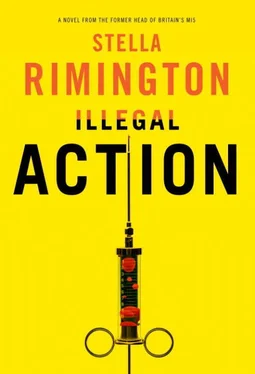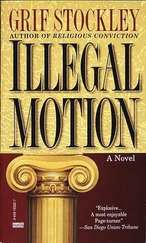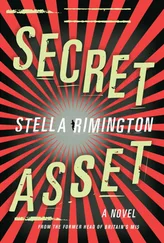She said, “What I don’t understand is who is negotiating for the owner. I thought she had a nephew.”
Dimitri watched her appraisingly. “I don’t know,” he said at last. “But why all these questions, Jane?” He did not seem to expect an answer. “Let’s go and join the others.” Something in his tone had changed; when he walked to the door and held it open, pointedly waiting for Liz, she realised it was the same autocratic note she had heard recently in Brunovsky’s voice. As if they were in charge, directing her. Or were they just being Russian?
In the drawing room Brunovsky and Greta were sitting on a long high-backed sofa at the far end of the room. Liz was surprised to see Jerry Simmons in the room too, sitting awkwardly on an Empire chair in the corner, leaning forward with his hands between his knees. “Come and sit down here, Jane,” said Greta, and patted the cushion next to her.
“Are we waiting for Miss Cottingham?” asked Liz.
“You could say that,” said Greta, and again she patted the cushion, this time more emphatically.
“I think I’ll take a walk around,” said Liz, pointing towards the terrace and gardens.
“In this rain? That’s not a good idea.” Greta’s eyes were tense, focused on Liz, who in turn looked at Brunovsky. He seemed a million miles away, thoughtful and detached from the people around him. When Liz turned to Dimitri, he gave a slight smile and she noticed that he was now standing between her and the door.
Okay, she thought, perhaps I won’t go for a walk after all. But she wondered, as she sat down on the sofa next to Greta, just what they were really waiting for.
Charles Wetherby was sitting in Brian Ackers’ office. What an uncomfortable, soulless kind of room, he reflected, with its Cold War library, the war-room map and the desk with its back to the window. The situation was even worse than he’d feared, which made him feel less guilty about leaving Joanne and coming back to work. “They need you,” she’d said firmly after DG’s first phone call.
“So do you,” he’d said.
“Not just at the moment, Charles,” and he knew she was thinking of the doctor’s candid assessment after the latest round of treatment. I can’t promise you more than a year but you should be stable now for at least a month or two.
She looked him in the eye then. “A little time by myself is what I need. Don’t worry—when I want you back with me, I’ll tell you.”
And so he’d returned, into this odd position—another man’s desk, another man’s job—trying to focus for the first time in many months on something other than his wife’s slow dying.
Brian’s secretary stuck her head round the door. She looked flustered, upset that her boss had gone off so suddenly. Charles wished she could explain why, having pressured Liz to remain in such a dangerous position, Brian had compounded his folly by sending Michael Fane to join her. From the little Charles knew of him, young Fane was inexperienced and headstrong—not the sort of officer to send into an unassessed situation on a rescue mission. Charles suspected it was this second mis-judgement that had led DG to remove Brian Ackers from his post and send him on gardening leave.
“Geoffrey Fane’s here,” the secretary announced flatly.
“Ask him to come in please.” He sighed inwardly at the prospect. He knew Geoffrey Fane; their paths had crossed over recent years in several counter-terrorist operations. Charles respected Fane for his intelligence and his skill at getting things done but he did not entirely trust him. The two men were products of the different cultures of their services. Fane came from a culture developed to train officers to be self-reliant, to work alone or in small groups, sometimes in hostile conditions, where the emphasis was on initiative and getting things done. Wetherby’s style came from working on complex investigations, in interdependent teams, where everything that was done might ultimately face scrutiny by parliamentary committee, official inquiry, the courts or even the press. To Charles’s mind Geoffrey Fane was devious and cut corners; to Fane’s, Charles was overcautious. Charles hoped Fane would be straightforward now; the last thing he needed in this situation was a game of cat and mouse.
“Charles,” said Fane coming into the room. He wore a dark pinstripe suit and a pale yellow shirt and spotted tie. They shook hands and sat down. “It’s good to see you back. I hope all is well at home?” said Fane. “Pity about the situation here.”
Charles ignored this; he wasn’t going to discuss Brian Ackers’ sudden departure with Fane, though he had no doubt it was all over Thames House and Vauxhall Cross by now. Instead he said, “I gather Liz Carlyle’s gone to Ireland with this man Brunovsky. Apparently they’re after some painting, but there seems good reason to believe something quite different is going on.” He paused. “You should know that your son Michael’s over there, too.”
“I did know that, actually. I was here to see Brian when Michael left.”
“I gather you know the background to why Liz was involved with this Brunovsky character. To save time I’ve asked Peggy Kinsolving to come in and brief us both on what she thinks the situation is, and you can fill me in on the background as we go along. The priority seems to me to get Liz and Michael out of there unharmed.”
Fane hesitated, then asked, “Is the situation dangerous?”
“It shouldn’t be for Michael. He’s with the Garda.”
Fane nodded, but his relief was momentary. “How about Liz?”
Charles shrugged. “I very much hope not.” He looked at Fane; it suddenly struck him that they were both equally worried about Liz. He’s fond of her too, thought Charles with a twinge of jealousy.
While they waited for Peggy, Fane got up and went to the window while Wetherby sat slowly tapping the end of a pencil on the desktop. Fane said, “I could never understand why Brian put the desk there. You’d think that having earned a river view, he’d want to enjoy it.”
The door opened and Peggy came in carrying a folder. She seemed surprised to find Fane there, and sat down carefully, looking apprehensive, as if she was walking into a trap. I sympathise, thought Wetherby.
Fane remained standing as Wetherby said, “Why don’t you give us an overview of where things stand, Peggy? Geoffrey probably knows most of it, but I don’t.”
She nodded and opened the folder, though she didn’t look at her notes. “Two months ago, we heard from MI6 that a trusted source had learnt about a possible plot against a dissident oligarch in London.”
Wetherby asked, “What was this plot supposed to consist of?”
“It was thought an assassination might take place here in London.”
“ Pour décourager les autres ,” said Fane lightly, still looking out the window.
“Really?” Wetherby could not conceal his scepticism. Surely after Litvinenko, the last thing the Russian authorities would want was blame for another murder of a disaffected expatriate.
Peggy went on. “At roughly the same time, A4 saw a Russian intelligence officer, a man named Vladimir Rykov from the Trade Delegation, conducting a covert meeting on Hampstead Heath. When they followed his contact, they discovered he was an ex-SAS soldier now working as driver for Nikita Brunovsky. It was then decided to put Liz undercover into Brunovsky’s household.”
“I do not really understand that decision,” interrupted Wetherby.
Peggy said nothing. Fane took a step back and shrugged. “One of Henry Pennington’s dafter ideas, Charles,” he said.
Charles looked at him sceptically. “Brian didn’t have to agree, Geoffrey. It’s not the FCO’s call.” But Fane just shrugged again.
Читать дальше












